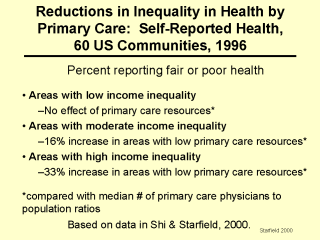 |
The
equity-enhancing effect of primary care is also evident for self-reported health. In a
study in 60 nationally representative US communities, areas with high income inequality,
that is, large differences in income between the wealthy and the non-wealthy, there was a
one-third increase in the reporting of poor or fair health if the area was poorly endowed
with primary care physicians. Areas with moderate income inequality also had an increase
in reporting of fair health of half that magnitude. Based
on data in: Shi L, Starfield B. Primary care, income inequality, and self-rated health in
the United States: a mixed-level analysis. Int J Health Serv 2000; 30(3):541-555. |
